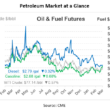Mark Allen Group, the UK-based B2B information and events company, has reported 2019-20 revenue of £54.6m (+6%) and EBITDA of £8.4m (-1%). But the numbers disguise a busy year of £21m acquisition spending, funded principally by bank debt.
The statutory accounts illuminate the smart deal-making of the family-owned company whose revenue has increased by 46% since 2017. In the year ended 31 March 2020, MAG made three principal acquisitions: UKiP airport and auto magazines for £6.3m; The Engineer (£2.2m), and Farmers Weekly (£12.6m). The latest accounts show that the UKiP deal, completed early in the trading year, generated total revenue of £8.1m and EBITDA of £1.1m – producing a first year price multiple of 8 x, despite the Covid cancellation of one of its largest events, an airport handling exhibition in Singapore.
The Engineer (and its subcon trade show) had revenue/ EBITDA pf £1.9m / £389k: a multiple of x 6. The Farmers Weekly acquisition from RELX did even better: in just three months of ownership, MAG earned revenue of £1.7m and EBITDA of £580k. For a full year, the Farmers Weekly profit may be £3m, producing a price multiple of x 4 – for a market-leading B2B brand with 40k subscriptions.
Some 18 months ago, before these latest acquisitions, founder and chairman Mark Allen told a publishing conference that he had made 24 acquisitions during the previous 10 years at a total cost of some £33m. These included Reed Business Information’s Community Care which he himself had launched as editor-in-chief back in 1974.
The deals had then contributed a total of some £53m of profit, with an average payback of three years. Some individual magazines are believed to have had a payback of just 12 months.
So, even with the medium-term future of many exhibitions still uncertain, the 37-year-old Mark Allen Group is well placed with £22m of debt in a business that might just have a total valuation of some £80-90m. But there is more to admire in MAG than its ability to continue to generate growth from seemingly unfashionable B2B magazine brands. For all its investment in digital and events, the company still generates 43% of its revenue from advertising and just 18% from subscriptions; almost 80% of its business is still in the UK.
Beyond the simple reality that low interest rates and multiples can make print-centric acquisitions an economic no-brainer, MAG is a strong content-focused business which can keep growing during the current year and will do so even more strongly once its events start to return in 2022-3. Its predominant focus is on B2B sectors – health, education, manufacturing, agriculture, and transport – in which it has multiple revenue streams and high levels of specialist journalism.
The future of so much B2B media must be in subscription, membership and advisory revenues from readers – not advertisers. And print is out of fashion. Of course. But you would bet that the sprightly Mark Allen Group will continue to generate impressive profits on the journey.




